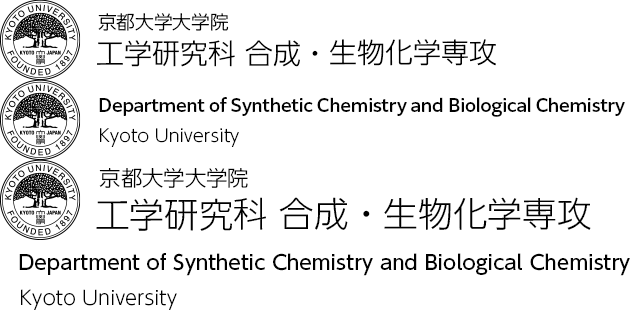Introduction to Research
The Department of Synthetic Chemistry and Biological Chemistry is composed of one full-time course (Organic System Design and two core courses (Synthetic Chemistry and Biological Chemistry), with each core course composed of four fields.
The following is a broad outline of the topics covered in each field; for details on specific research themes, please refer to each lab (field).
In the Synthetic Chemistry Course, the field of physical organic chemistry deals with the correlation between structure and properties in functional molecules and the development of new theories and chemical concepts in quantum chemistry.
The field of organic Synthesis deals with advanced control of organic reactions based on skilful utilization of electron mobility and reaction agents, and the development of automatic synthesis systems based on an understanding of continuous reactions as systems, from the perspective of process engineering.
Work in the field of organometallic chemistry combines a diversity of chemical bonds--a characteristic of organic chemistry--and a diversity of chemical elements--a characteristic of inorganic chemistry--to realize the creation of materials with wide-ranging properties.
The field of functional coordination chemistry works to promote the design of new materials involving the dynamic structure of inorganic–organic composite molecular aggregates and composite electronic materials, and the creation of materials utilizing nano-vacancies, nonlinear phenomena, and quantum effects.
With advances in genome analysis, there are rapidly expanding efforts to discover the essence of the order of life through comprehensive analysis of genes (genomes) and proteins (proteomes), and to apply these to medical diagnosis and treatment. This is a field in which synthetic chemistry techniques can be of great utility.
In the Biological Chemistry Course, the field of bioorganic chemistry is concerned with research that focuses on live cells, which are aggregates of biomolecules, from the perspective of organic chemistry, with the following aims--the development of sensors, imaging probes, and labeling materials targeted to specific proteins; artificial modification of functions by means of protein organic chemistry; and control of the functions of biomolecules in semi-wet environments provided by innovative biomaterials.
In the field of biorecognition chemistry, the aim is to develop innovative biotechnology for analyzing, controlling, repairing, and modifying life phenomena as chemical systems from a chemical biology perspective, and the construction of artificial life systems.
The field of molecular biology is concerned with the elucidation of cellular response mechanisms in various types of living tissue, such as the cerebral nervous system, under normal conditions, and also with the molecular motion of bio-signals, using molecular biology and cellular engineering techniques, for the purpose of exploring the chemical basis of the causes of disease.
The field of biochemical engineering is concerned with the analysis of life phenomena of all types from a chemistry perspective, focusing on microorganisms, and, in addition, pursuing a broad range of research aimed at environmental improvement and industrial applications.
In this way, the Biological Chemistry Course takes up a variety of challenges aimed at elucidating, utilizing, and modifying natural biological functions as chemical systems from the perspective of chemical biology.
The full-time course (Organic System Design) tackles the design and production of new chemical reactions and materials that can serve as a basis for the creation of useful materials for 21st century society, and the development of efficient material transformation techniques.
